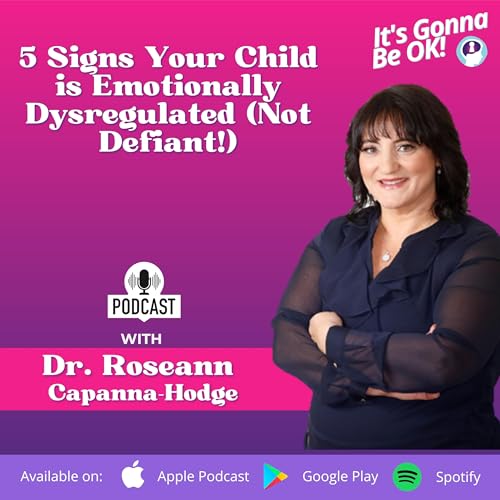
336: 5 Signs Your Child is Emotionally Dysregulated (Not Defiant!)
Failed to add items
Add to basket failed.
Add to Wish List failed.
Remove from Wish List failed.
Follow podcast failed
Unfollow podcast failed
-
Narrated by:
-
By:
About this listen
Parenting a child who pushes back at every turn can feel downright draining. You’ve tried the time-outs, the sticker charts, the consequences—yet the meltdowns keep coming. It’s easy to start second-guessing yourself or wondering if you’re doing something wrong. You’re not alone. It’s not bad parenting—it’s a dysregulated brain.
In this episode, I’ll show you why what looks like defiance is actually emotional dysregulation—a nervous system issue, not a character flaw. We’ll walk through the five signs your child is emotionally dysregulated, not defiant, and I’ll give you practical, brain-based steps you can use to calm the storm and move forward with hope.
Why does my child overreact to small problems?
One of the biggest giveaways of emotional dysregulation is when kids have big feelings over little things. Maybe it’s the broken crayon, the wrong-colored cup, or being asked to do five more minutes of homework.
These disproportionate reactions are a sign that your child’s nervous system is in overdrive. It isn’t bad behavior—it’s your child’s body signaling stress overload.
For younger children, this often looks like temper tantrums. For older children, it may show up as irritability, anger, or even shutting down. No matter their age, these big emotions tell you that their emotional regulation skills need support.
The key question to ask yourself is: Is this their go-to response? If your child is regularly melting down over small problems, it’s not about being oppositional or defiant. It’s a clear sign they’re struggling with:
- Emotional regulation
- Self control and coping skills
- A dysregulated brain that needs help returning to calm
When you reframe these moments as emotional dysregulation rather than “bad behavior,” it shifts how you respond. Instead of getting caught in power struggles, you can focus on calming the brain first—because that’s where real change begins.
Why does my child stay upset long after a problem is solved?
Some kids just can’t seem to let go. Even after the situation is over, they’re still stuck in those big emotions long after everyone else has moved on.
This isn’t about holding a grudge—it’s their nervous system getting caught in a stress loop. No matter how much reassurance you give, they may replay the moment again and again.
That’s what emotional dysregulation does: it traps kids in the feeling and blocks them from practicing self regulation on their own.
So what helps? Co-regulation. Your child’s behavior is communication, and what they need most is your calm presence. That means:
- Keeping your tone soft and steady
- Modeling deep breaths and slowing your body down
- Staying close so they feel safe, even if they don’t accept comfort right away
🗣️ “Your child isn’t choosing to stay upset—they’re stuck in a stress loop. When you calm your own nervous system, you give their brain the roadmap back to regulation.” – Dr. Roseann
When we, as parents, stay calm first, we give our kids the emotional skills and examples they need to eventually regulate their own emotions.
Why does my child reject comfort when upset?
It’s heartbreaking when you reach out to comfort your child and they push you away, scream, or even call you names. While it feels like rejection, what’s really happening is that their brain is flooded and their nervous system can’t take in more input.
A dysregulated child often can’t receive comfort until their body begins to settle. These emotional responses aren’t about disrespect or bad behavior—they’re stress-driven survival mode. And remember, even adults sometimes need space before they can calmly re-engage.
What...


